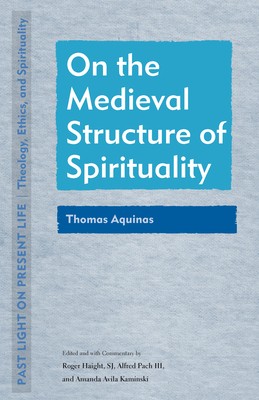
- We will send in 10–14 business days.
- Publisher: Fordham University Press
- ISBN-10: 1531502199
- ISBN-13: 9781531502195
- Format: 14 x 21.6 x 0.7 cm, softcover
- Language: English
- SAVE -10% with code: EXTRA
On the Medieval Structure of Spirituality (e-book) (used book) | bookbook.eu
Reviews
Description
If Thomas Aquinas was born in 1225, as is commonly thought, then he died before reaching the age of fifty after producing the single most influential systematic theology of the Western Christian tradition. He did this with a formula: He internalized the thought of Aristotle as it was being introduced into western Europe and translated into Latin, and he in turn "translated" Christianity into this Aristotelian language. One can use the principles of hermeneutics outlined in Retrieving the Spiritual Teaching of Jesus of this series to analyze what was going on as Aquinas went through some of the basic doctrines of the Church in his Summa Theologiae. He laid out their contents by answering an exhaustive series of questions and responding to each of them in intricate detail. The model for each question and answer was drawn directly from the pattern of learning at the University of Paris. Although systematic and abstract, it also enabled an extensive conversation with the tradition of classical theologians and his own contemporaries. This may seem quite distant from spiritual life on the ground, but the method produced a clear understanding of the structure of spiritual life in terms of its goal and the means of attaining it. Aquinas's analysis of grace--how it enabled genuine Christian spirituality, empowered the virtues, and led to eternal life--constitutes a classic substructure of Western Christian spirituality that became all the more distinctive when Reformation spiritualities offered alternatives to it.
- Publisher: Fordham University Press
- ISBN-10: 1531502199
- ISBN-13: 9781531502195
- Format: 14 x 21.6 x 0.7 cm, softcover
- Language: English English
If Thomas Aquinas was born in 1225, as is commonly thought, then he died before reaching the age of fifty after producing the single most influential systematic theology of the Western Christian tradition. He did this with a formula: He internalized the thought of Aristotle as it was being introduced into western Europe and translated into Latin, and he in turn "translated" Christianity into this Aristotelian language. One can use the principles of hermeneutics outlined in Retrieving the Spiritual Teaching of Jesus of this series to analyze what was going on as Aquinas went through some of the basic doctrines of the Church in his Summa Theologiae. He laid out their contents by answering an exhaustive series of questions and responding to each of them in intricate detail. The model for each question and answer was drawn directly from the pattern of learning at the University of Paris. Although systematic and abstract, it also enabled an extensive conversation with the tradition of classical theologians and his own contemporaries. This may seem quite distant from spiritual life on the ground, but the method produced a clear understanding of the structure of spiritual life in terms of its goal and the means of attaining it. Aquinas's analysis of grace--how it enabled genuine Christian spirituality, empowered the virtues, and led to eternal life--constitutes a classic substructure of Western Christian spirituality that became all the more distinctive when Reformation spiritualities offered alternatives to it.


Reviews